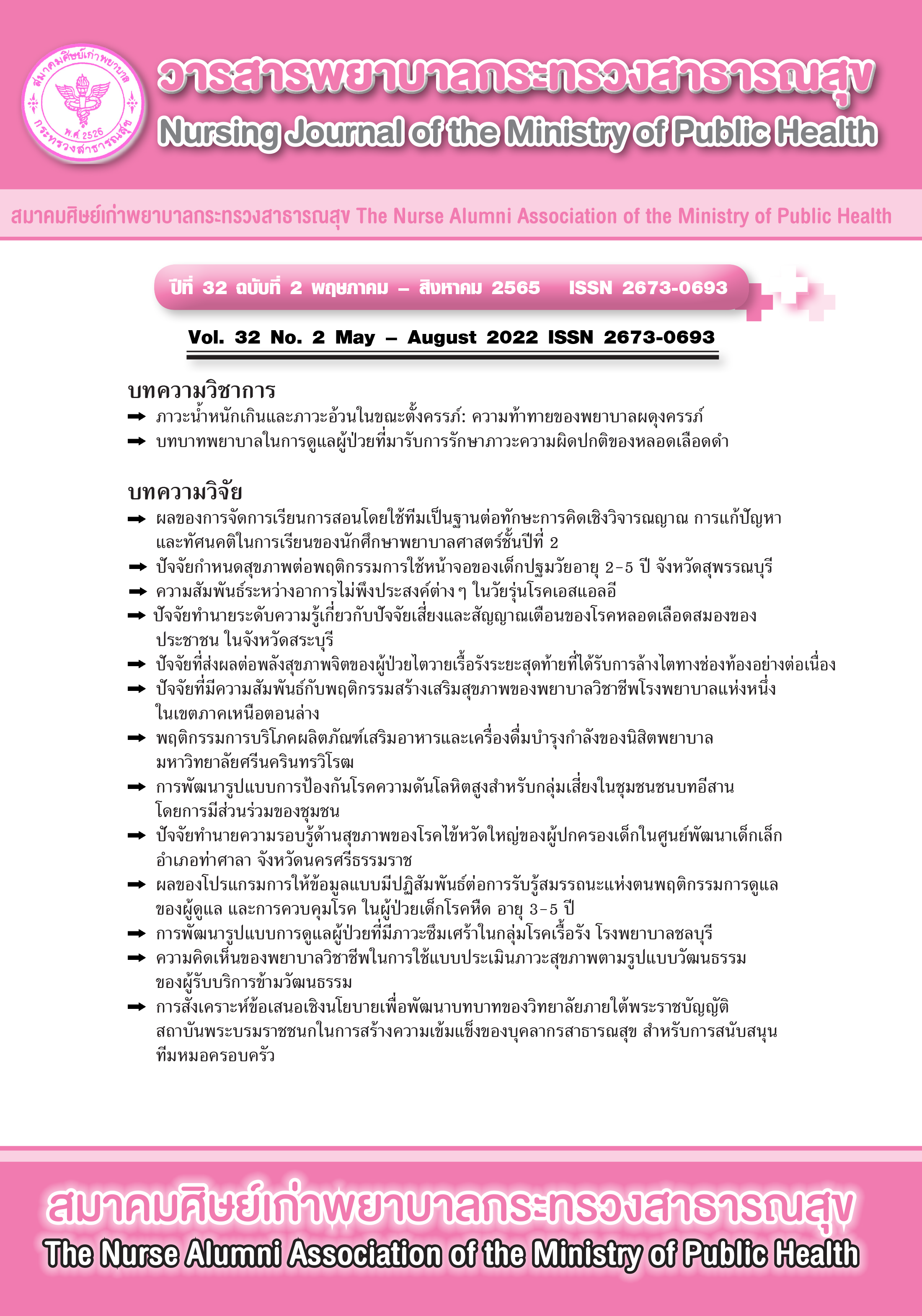Effects of an Interactive Giving Information Program on Perceived Self-efficacy, Caring Behaviors of Caregivers and Disease Control in Children with Asthma Aged 3-5 Years Old.
Main Article Content
Abstract
This study used a two-group pretest-posttest quasi-experimental research design that aimed to investigate the effects of an interactive information program on caregiver’s perceived self-efficacy, caring behaviors and asthma control of children with asthma aged 3-5 years. The sample consisted of 26 caregivers of children with asthma aged 3-5 years which was selected by purposive sampling from the pediatric respiratory care clinic in Khon Kaen Hospital. Thirteen subjects in the control group received usual care, while 13 subjects in the experimental group received the interactive information program. During weeks 2 and 3, interactive information was given twice for 30-45 minutes via video call to develop skills in assessing and caring for children with asthma. Daily caregiver’s performance of expected behaviors was monitored, questions were answered, and positive reinforcement was provided via video call. Data were collected before and 4 weeks after program implementation by using Caregivers’ Perceived Self-Efficacy Assessment Scales (CVI=1; Cronbach’s alpha=.90), Caregivers’ Care Behaviors Assessment Scales (CVI=1; Cronbach’s alpha=.74) and Asthma Control Level of Children Assessment Scales (Global Initiative for Asthma: GINA 2018). Data were analyzed using descriptive statistics, Fisher’s exact test and t-test. The results showed that the caregivers’ perceived self-efficacy and caring behaviors in the experimental group at week 4 after program implementation were significantly higher than caregivers in the control group (p .05), and were significantly higher than those before attending the program (p .05). Asthma control level of children with asthma aged 3-5 years between these two groups was no statistically significant (p .05). The results suggest that the interactive information program can be used to promote caregivers’ perceived self-efficacy and behaviors in caring for children with asthma aged 3-5 years. The results can serve as preliminary data for nurses to promote asthma management interventions via video calls to caregivers and their children with asthma.
Article Details

This work is licensed under a Creative Commons Attribution-NonCommercial-NoDerivatives 4.0 International License.
บทความและรายงานวิจัยในวารสารพยาบาลกระทรวงสาธารณสุข เป็นความคิดเห็นของ ผู้เขียน มิใช่ของคณะผู้จัดทำ และมิใช่ความรับผิดชอบของสมาคมศิษย์เก่าพยาบาลกระทรวงสาธารณสุข ซึ่งสามารถนำไปอ้างอิงได้
References
Global Asthma Network. The global asthma report 2018. [internet]. 2018 [cited 2022 Mar 22]. Available from http://globalasthmanetwork.org/Global%20Asthma%20Report%202018.pdf.
Nasamon W, Suchada S, Jitlada D. Prevalence of asthma, level of control and factors associated with asthma control in Thai elementary school students in Bangkok. Asian Pac J Allergy Immunol 2014;32:287-92.(in Thai)
Worldlifeexpectancy. Death rate from asthma. [internet]. 2021. [cited 2021 May 19]. Available from https://www.worldlifeexpectancy.com.
Yodyin K, Sutham J, Manoyot N, Unchalee P. Medical service charges of childhood asthmatic patients admitted at Maharaj Nakorn Chiangmai hospital. Isan Journal of Pharmaceutical Sciences 2012;8(2):53-9.(in Thai)
Information management of medical informatics group in Khon Kaen hospital. Statistics of children with asthma [unpublished]. Khon Kaen: Khon Kaen Hospital;2021.
Wathanachai P, Aree P, Lamchang S. Asthma severity, family management behavior and asthma symptom control in children among family caregivers. Nursing Journal 2016;43(2):1-12.(in Thai)
Niyomwit K. Nursing care for ill children with acute asthmatic attack. Journal of Phrapokklao Nursing College 2017;28(1):149-60.(in Thai)
Dangsuwan T. Childhood asthma. Journal of the Department of Medical Services 2016;41(4):5-15.(in Thai)
Global Initiative for Asthma (GINA). [internet]. 2018 [cited 2019 Jun 1]. Available from http://ginasthma.org/2018-gina-report-global-strategy-for-asthma-management-and-prevention.
Nookong A, Payakkaraung S, Pongsaranuntakul Y, Chudapongse S. Caregivers’ management for children with asthma. Journal of Nursing Science 2012;30(1):49-60.(in Thai)
Ton S. Clinical outcomes of pediatric asthma at asthma clinic of Phimai hospital. Maharat Nakhon Ratchasima Hospital Medical Bulletin 2017;39(3):173-82.(in Thai)
Bandura A. Self-efficacy: toward a unifying theory of behavioral change. Physiological Review 1997;84(2):191-215.
Pontan K, Ratchanakun P. The effects of a self-efficacy program on the health care behaviors of teachers of school-age children with asthma. Journal of Nursing and Health Care 2019;37(2):160-9.
Wood MR, Price JH, Dake JA, Telljohann SK, Khuder SA. African American parents’/guardians’ health literacy and self-efficacy and their child’s level of asthma control. Journal of Pediatric Nursing 2010;25(5):418-27.
Wattana P. Effect of self-efficacy enhancement program on parents’ behavior toward asthma prevention in children. [Master Thesis in Pediatric Nursing]. Chiang Mai: Chiang Mai University;2007.(in Thai)
Hannan J, Brooten D, Page T, Galindo A, Torres M. Low-income first-time mothers: effects of APN follow-up using mobile technology on maternal and infant outcomes. Global Pediatric Health 2016;3:1-10.
Sessoms D. Interactive instruction: Creating interactive environments through tomorrow’s teachers. International Journal of Technology in Teaching and Learning 2008;4(2):86-96.
Shields MD, Alqahtani F, Rivey MP, Mcelnay JC. Mobile direct observation of therapy (MDOT)-a rapid systematic review and pilot study in children with asthma. PLoS ONE 2018;13(2):1–24.
Khwansuk N, Nookong A. The effect of a home environmental management program for children with asthma on caregivers’ management behavior. Journal of Nursing Science 2011;29(3):94-102.(in Thai)
Chuaykaen B. The effect of health promoting program on caring behaviors of caregivers of the pre-school children with asthma. Journal of Nursing Division 2013; 40(3):41-55.(in Thai)
Zarei AR, Jahanpour F, Alhani F, Razazan N, Ostovar A. The impact of multimedia education on knowledge and self-efficacy among parents of children with asthma: a randomized clinical trial. Journal of Caring Sciences 2014;3(3):185–92.
Piengjai C, Teerarungsikul N, Sananreangsak S. Effect of perceived self-efficacy enhancement program on caring behaviors among caregivers of children with acute respiratory infection. Thai Journal of Nursing 2018;67(3):1-9.(in Thai)
Pimkhot N, Suebsoh W, Teewunda D. Effect of perceived self-efficacy and social support on behavior modification of asthma patients. The Public Health Journal of Burapha University 2013;8(2):81-91.(in Thai)
Tangcheewawatthanakul C. Factors associated with disease controlled in childhood asthma at Phang-nga Hospital. Region 11 Medical Journal 2018;32(4):1269-82.(in Thai)

